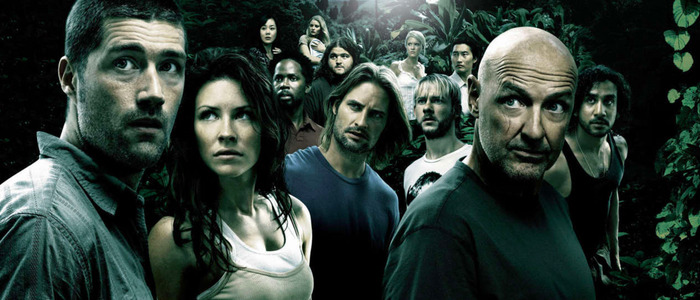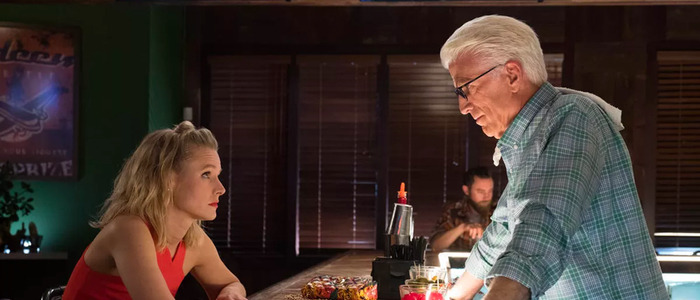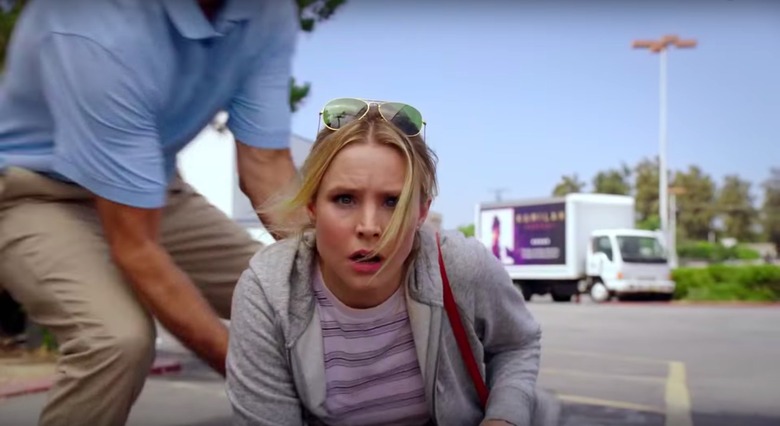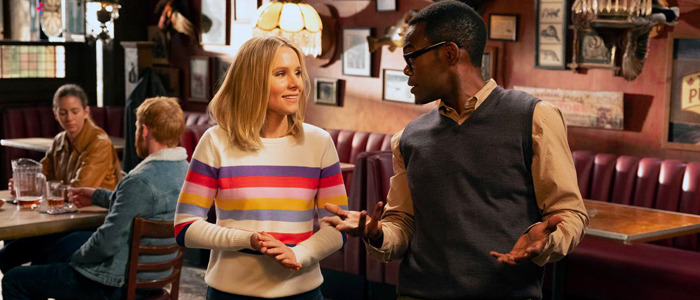'The Good Place' Needs To Take A Page From The 'Lost' Playbook And Announce An End Date
Michael Schur, the creator and showrunner of NBC's ambitious philosophical comedy The Good Place, has never been shy about acknowledging the inspiration he found in ABC's seminal sci-fi action drama Lost. Though the two shows, on the face of it, would seem to be wildly different, you can not only spot references to Lost in The Good Place, but Schur both consulted with Lost co-showrunner Damon Lindelof early in the run of the comedy, and Lost writer Drew Goddard has directed a handful of episodes, including the pilot.There's one more place in which The Good Place needs to find some inspiration from Lost, though, and hopefully soon: it's time for The Good Place to announce its end date.
This post contains major spoilers for all three seasons of The Good Place.
The Shape of Things to Come
Depending on how good your memory is, you may not remember the appropriately unique way in which ABC announced that Lost was wrapping up. The year was 2007, and Lost had gone through a roller-coaster of popularity through barely 3 seasons. The show's first season, full of exciting mysteries, characters, and cliffhangers, won the Best Drama Emmy; the second season, however, didn't even get a Best Drama Emmy nomination. By season three, ABC tried to mix things up with a six-episode kick-off that felt like a self-contained story meant to drum up excitement. But by the spring of 2007, the show hit a creative nadir: an episode whose trademark flashbacks were all about Jack Shephard (Matthew Fox) and his mysterious...tattoos.That episode, the obnoxious "Stranger in a Strange Land", and its largely negative reaction from critics and fans, is what led Lindelof and fellow showrunner Carlton Cuse to convince ABC to let them establish the endgame of Lost. Fans would still have to guess where the show was going, but knowing that there was somewhere the show could go was enormously relieving. So in May of 2007, ABC announced that it had renewed Lost for three more seasons, with the sixth being its last.Lost announced its ending — and, to note, improved vastly in its final three 16-episode seasons because there was a sense of propulsion absent from much of its second and third seasons — because the show was spinning its wheels. On one hand, that is absolutely not the issue with The Good Place. I'll note here that I still am a huge fan of Schur's wildly distinctive comedy, which began with a heady enough premise: a woman named Eleanor Shellstrop (Kristen Bell) wakes up in an afterlife called The Good Place, and is terrified to realize that, through a clerical error, she has taken the place of another woman with the same name who was vastly more deserving of going to Heaven.Over 39 episodes in three seasons (the third season concluded on January 24), The Good Place has burned through plot at a shocking rate, specifically after the first-season finale threw out a shocking twist. Eleanor and the oddball friends she's made so far are actually in a version of the Bad Place designed to emulate the Good Place as a new form of torture. Their Good Place architect, Michael (Ted Danson), is actually a Bad Place demon overseeing the hell-is-other-people-style torture.
A Roller Coaster of Plot
From that point, The Good Place felt like a different show, and an even more thrilling one. The show's second season offered a major shift from its predecessor, and for the better — where the first season charted Eleanor's shift towards goodness, the second season focused on how the literally demonic Michael could become a genuinely good and caring character. Danson, of course, sold the shift incredibly, but he was aided by scripts that laughed in the face of normal TV-storytelling progress. As Schur has noted in interviews, in another writer's hands, the first season cliffhanger wouldn't have been Eleanor realizing she's in the Bad Place. Instead, the first season might have ended with her admission that she doesn't belong in the Good Place at all, an event that takes place roughly halfway through the first season. That was a sign of things to come.In the second season's third episode, "Dance Dance Resolution", the show began its fast burn. The previous season ended not just with Eleanor realizing she was in the Bad Place, but with Michael erasing her memories, as well as the memories of her friends Chidi (William Jackson Harper), Tahani (Jameela Jamil) and Jason (Manny Jacinto), and restarting his Bad Place experiment. But by "Dance Dance Resolution," it became clear that in every reset of the experiment, Eleanor or one of her friends would realize what was truly going on, and Michael would have to reset things again so that his own Bad Place boss wouldn't suspect anything was wrong. So Michael reset the experiment more than 800 times, all in the span of one 22-minute episode.Resetting things is something The Good Place has done a lot lately. Here's a few examples (with heavy third-season spoilers, so consider yourself warned): Michael and Janet (D'Arcy Carden), his partner/best friend/sidekick who's also an omniscient being who holds all knowledge of the universe while not being human or robot herself, monitor Eleanor, Chidi, Tahani, and Jason on Earth after they've been allowed to restart their lives from the moment when they had previously died. Michael and Janet, fearing the four humans are reverting back to their old ways, nudge Chidi and Simone, a neuroscientist at a Sydney, Australia-based university, to create a joint study researching near-death experiences and how it changes people's morality, thus bringing the four humans back together. For a year, Michael and Janet monitor the humans, until they accidentally reveal themselves and inform the four humans of what's really going on.They then band together as a self-pronounced "Soul Squad" to make other people get better so they can get into The Good Place, eventually letting Michael bring them to meet the one person who best represents every possible great decision a human could make. They then learn that even though this character lives his life the best way possible, the most humane way possible, even he can't get into the Good Place. So Michael decides to ferret out who within the Bad Place must be manipulating the points system, only to shift his mindset and appeal to the Judge (Maya Rudolph, in a recurring role) that the problem is that the points system combined with modern life makes it too hard for anyone to get into the Good Place. The Judge works with Michael and Bad Place emissary Shawn (Marc Evan Jackson) to create a new Good Place/Bad Place experiment, but with four new humans. Until it becomes clear that Shawn has chosen four humans who all have particular relevance to our four human heroes. With this, Chidi decides to have his own mind wiped to eliminate any conflicts of ethical interest between himself and his friends.
Taking a Leap to Faith
If you haven't seen The Good Place's third season, you should know that the previous paragraphs are a high-level description of the entire season's plot. It's a lot. You could argue that it's almost too much. The first season had a successful throughline — Eleanor, Chidi, Tahani, and Jason were all in "the Good Place" and all trying to figure things out together. And so did the second season — can the four humans, with Michael and Janet, fool the other Bad Place demons that the experiment is still going strong? But once the characters abandoned Michael's Good Place experiment entirely (with a few episodes left in season two), it became less an issue of wheel-spinning than of the wheels beginning to fall off.There have been a lot of great things about The Good Place's third season. The show remains incredibly well-cast, from the main ensemble to the guest actors. (The actor who played the father of Jason, himself a lovable version of the Florida Man meme, was a jaw-dropping piece of casting, seeming to mimic Jacinto's performance style without being an echo of the younger performer.) There's been a lot of great humor throughout each of the plot resets this season, too; each of the lead actors has found new and intriguing ways to bring unexpected hilarity to what continues to be the strangest show on network television. And it's remarkable how the show is able to chug through plot and exposition in a way that rarely feels dull.But from its first episode, The Good Place has felt like a show that needed to have a definitive end-point. Even if you don't know Michael Schur's name, you probably know the other shows he's worked on: he was part of the writing staff of the American remake of The Office from its first season, before co-creating Parks and Recreation and Brooklyn Nine-Nine. Notably, The Good Place has only ever had 13-episode seasons, unlike those other programs (the other shows had some seasons with more than 22 episodes). That's enabled The Good Place to rarely feel like it has any episodes that waste time, or that reiterate familiar storytelling tropes.The difference, though, is that The Good Place has to have a much more defined conclusion than any of Schur's other programs. The Office could have feasibly run for a decade longer–- there would still be paper to sell and awkwardness to mock. (Having said that, when Steve Carell left the show, its quality took a steep downturn. When Michael Scott left Dunder Mifflin, so too should the documentary crew filming the office's foibles.) Parks and Recreation trucked along comfortably for a handful of seasons before throwing things out of whack in its final season by doing a time-jump into the faraway future of 2017. (Even still, that wonderfully upbeat comedy could probably have called it quits after its fifth or sixth season without losing any of its luster.)
A Love Story That Doesn’t Feel Epic
One thing all of those shows have in common is a core romantic relationship that ends up defining the series in one way or another. The Office had Jim and Pam, a pairing that was fueled by off-the-charts chemistry between actors John Krasinski and Jenna Fischer. Parks and Recreation had Leslie Knope and Ben Wyatt, where the actors made the romance work while the show around them still managed to be goofy and quirky. Brooklyn Nine-Nine has Jake Peralta and Amy Santiago, whose romance has managed to morph into just another part of the still consistently hilarious off-kilter cop comedy. The Good Place, however, has Eleanor and Chidi, whose love is meant to be Jim/Pam-level epic, but hasn't ever felt that way.The ripple effect of the third-season finale for The Good Place has been fascinating to witness. On the show's weekly podcast (hosted by improviser/actor Marc Evan Jackson, who plays Shawn), Jackson, Schur and Danson spoke at length about the emotional underpinnings of the finale. Listening to the podcast (as I've done since it started last summer) was evidence of a striking disconnect that's cropped up in some post-show writing, too. The creators of the show clearly feel that the Eleanor/Chidi relationship is a major part of the program, much as Schur and the other writers of The Office likely perceived the Jim/Pam relationship. While Bell and Harper are excellent actors, doing their best work, the chemistry they have isn't enough to allow for such high stakes. And critics from Vox, Rolling Stone, and more were left a bit cold by the finale, because for it to work, you have to care about that specific relationship.It's not surprising that sweetly defined relationships have become more pronounced on The Good Place as it goes along. It happened on other shows of the Michael Schur-iverse, but it was easier to get away with those relationships being so major; at their best, these shows aren't plot-driven, but character-driven. The Good Place, though, is different — it's as much a show about its story as its characters. So if there's one reason why the third-season finale felt underwhelming, it's this: Chidi might have forgotten who Eleanor is. For now. The show resets its plot so much that I couldn't help but wonder how many episodes into season four it will take for the show to reset itself again. Three? Two? Maybe just the premiere?The ending felt lacking because it felt like anything could change at any minute. And that's because The Good Place, never a massive ratings performer but always a solid source of buzz and a recipient of good DVR ratings, has a fourth season on the way and might even get a fifth season if that's what NBC and Schur want. But what might be necessary is for Schur to go back to his source of inspiration once more. It worked for Lost to admit that the show's endpoint wasn't just a dot at the end of the tunnel. It'll work for The Good Place to know that there's an end in sight, and not just another reset.




